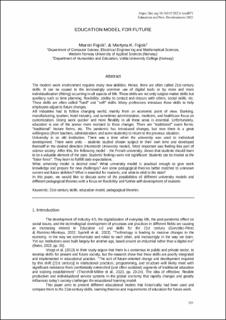Education model for future
Chapter
Published version
Permanent lenke
https://hdl.handle.net/11250/3126721Utgivelsesdato
2023Metadata
Vis full innførselSamlinger
Originalversjon
Fojcik, M. A. & Fojcik, M. (2023). Education model for future. I M. Carmo (red.), Education and New Developments 2023 – Volume 1 (s. 335-339). inScience Press. https://end-educationconference.org/wp-content/uploads/2023/07/2023v1end071.pdfSammendrag
The modern work environment requires many new abilities. Hence, there are often called 21st-century skills. It can be caused to the increasingly common use of digital tools or by more and more individualization (fitting) occurring in all aspects of life. These skills are not only subject-matter skills but auxiliary such as time planning, flexibility, ability to contact and discuss with others, social skills, etc. These skills are often called "hard" and "soft" skills. Many professions introduce these skills to help employees adjust to future changes.
All industries had to follow changing world, mainly from an economic point of view. Banking, manufacturing, tourism, hotel industry, and sometimes administration, medicine, and healthcare focus on customization. Doing work quicker and more flexibly in all these areas is essential. Unfortunately, education is one of the arenas more resistant to these changes. There are "traditional" exam forms, "traditional" lecture forms, etc. The pandemic has introduced changes, but now there is a great willingness (from teachers, administration, and some students) to return to the previous situation.
University is an old institution. There was a time when the university was used to individual development. There were units – students studied chosen subject in their own time and developed themself in the desired direction (Humboldt University model). Most important was feeling like part of science society. After this, the following model – the French university, shows that students should learnto be a valuable element of the state. Students' feelings were not significant. Students can be treated as the "labor force". They learn to fulfill state expectations.
What university model is desired now? What university model is practical enough to give work knowledge and prepare for new challenges? Are some pedagogical theories better matched to unknown current and future abilities? What is essential for students, and what is vital to the state? In this paper, we would like to discuss some of the possibilities of different university models and different pedagogical theories with a focus on flexibility and further self-development of students.
